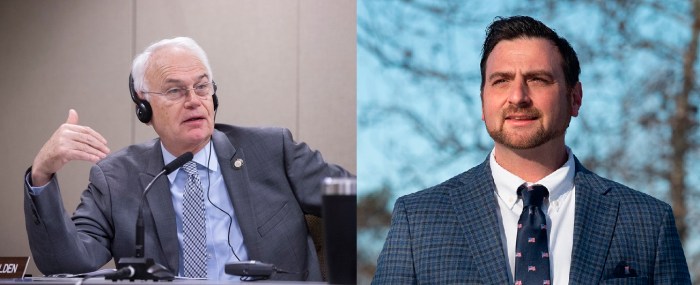WASHINGTON – When Los Angeles County police found Commerce Secretary John Bryson unconscious and alone in his bashed-up Lexus on June 9, he had no security team or automatic system to sound the alarm that he was in trouble.
While Bryson survived – he resigned Sunday citing a condition that caused a seizure diagnosed after he crashed his car twice that day – the case raises questions about why the 10th official in line to succeed the president was left so vulnerable, according to James Carafano, a terrorism scholar at the Heritage Foundation in Washington.
“They lost track of him,” Carafano said. “Post-9/11, that’s a bit of a head-scratcher.”
Bryson’s incident highlights potential gaps in security for senior U.S. government officials, who receive varying levels of protection.
Defense Secretary Leon Panetta and Secretary of State Hillary Clinton, who are high in the line of succession and have national-security responsibilities, receive protection 24 hours a day, seven days a week.
But such full-time safeguards remain the exception. Federal officials, even in cabinet-level positions or other top posts, often travel without the security details that even a big-city mayor or state governor would be provided.
lthough Bryson, who was off-duty when the crashes took place, didn’t have a national-security portfolio, he oversaw an agency with 47,000 employees and a $7.5 billion budget. A member of President Obama’s economic team, Bryson was charged with delivering on Obama’s goal of doubling annual U.S. exports to $3.14 trillion by the end of 2014 from 2009 levels.
Threats to cabinet-level officials aren’t overblown, said Norman Ornstein, a congressional scholar at the American Enterprise Institute, a Washington-based policy group. Since the Sept. 11 attacks, he has urged the government to revamp its succession plans.
A nuclear bomb hidden in a suitcase detonated in Washington “could leave a headless government,” he said.
Government officials face a steady stream of threats. Prosecutors brought 301 cases against defendants who assaulted federal workers performing their duties in the fiscal year that ended Sept. 30, according to the Justice Department, about the same amount as the previous two years.
The Secret Service had a $1.1 billion budget to provide protection in the fiscal year that ended Sept. 30. The Obama administration has requested $988 million for fiscal year 2013. George Ogilvie, a Secret Service spokesman, declined to say how many people the agency is protecting.
In addition to the president, vice president and their families, the agency protects others at risk such as major presidential candidates and former presidents.
After the Sept. 11 attacks, President George W. Bush’s administration considered extending Secret Service protection to all cabinet members, said Ralph Basham, a former director of the agency.
The administration decided against the change.
“It was deemed unnecessary to require that level of security,” Basham said, and the administration approved a plan to better share threat information between agencies.
Most departments have their own security details for their leaders. Clinton, for example, has a State Department team guarding her “everywhere she travels in the world,” according to the department website. Seventy-two special agents provide protection for the secretary, according to a November 2009 report by the Government Accountability Office.
Panetta relies on agents from the Army Criminal Investigation Command, who are sworn federal law enforcement officers, said Chris Grey, a spokesman for the command.
Some of the agents protecting Panetta have backgrounds in military special forces or federal law enforcement agencies, such as the Bureau of Alcohol, Tobacco, Firearms and Explosives, Grey said.
The Commerce Department’s Office of Security provides protection for its secretary, according to the agency website.
A past job posting on allPoliceJobs.us said the duties of the protection team’s supervisor include overseeing the secretary’s travel plans and accompanying the cabinet official on trips. Special Agent Duane Christian died in the same 1996 plane crash in Croatia that killed then-Secretary of Commerce Ron Brown.
Bryson, 68, was in California, where he owns a house, when he crashed his vehicle into two other cars about two miles apart.
Bryson became Commerce secretary after Gary Locke took over as U.S. ambassador to China. On June 11, Bryson transferred his duties to Deputy Commerce Secretary Rebecca Blank, an economist whom he named as acting secretary.
Concerns that U.S. lawmakers may be vulnerable to threats rose again after Rep. Gabrielle Giffords, D-Ariz., was shot in the head last year in Tuscon in an incident that claimed six lives and prompted her resignation from Congress.
Lawmakers are accompanied by U.S. Capitol Police in their states only in some cases, said Lt. Kimberly Schneider, a spokeswoman for the force.
After Giffords was shot, members of Congress considered whether they needed more protection, Ornstein said. Ultimately, most lawmakers rejected making major changes to their security because they thought it would be a barrier between them and their constituents, he said.
Last month, Supreme Court Justice Stephen Breyer’s Washington home was burglarized. Three months earlier, he and his wife were robbed in their vacation home on the Caribbean island of Nevis by a man brandishing a machete.
Supreme Court justices are protected by the court’s police force when in Washington, and U.S. Marshals Service provides security at events in the rest of the country.
Providing all cabinet secretaries with a similar level of security is unnecessary because the threats they face aren’t the same, Ornstein and Carafano said.
“I would be cautious about every cabinet official needing to be followed by a goon squad,” Carafano said. “Overprotecting cabinet officials could be a waste of money.”
For Bryson and cabinet officials in similar roles, a device that would communicate with security when there’s trouble might be all that’s needed, Basham said. Such technology is readily available to consumers and could be adapted.
“They should have some means of alerting authorities,” he said.
(c) 2012, Bloomberg News.























